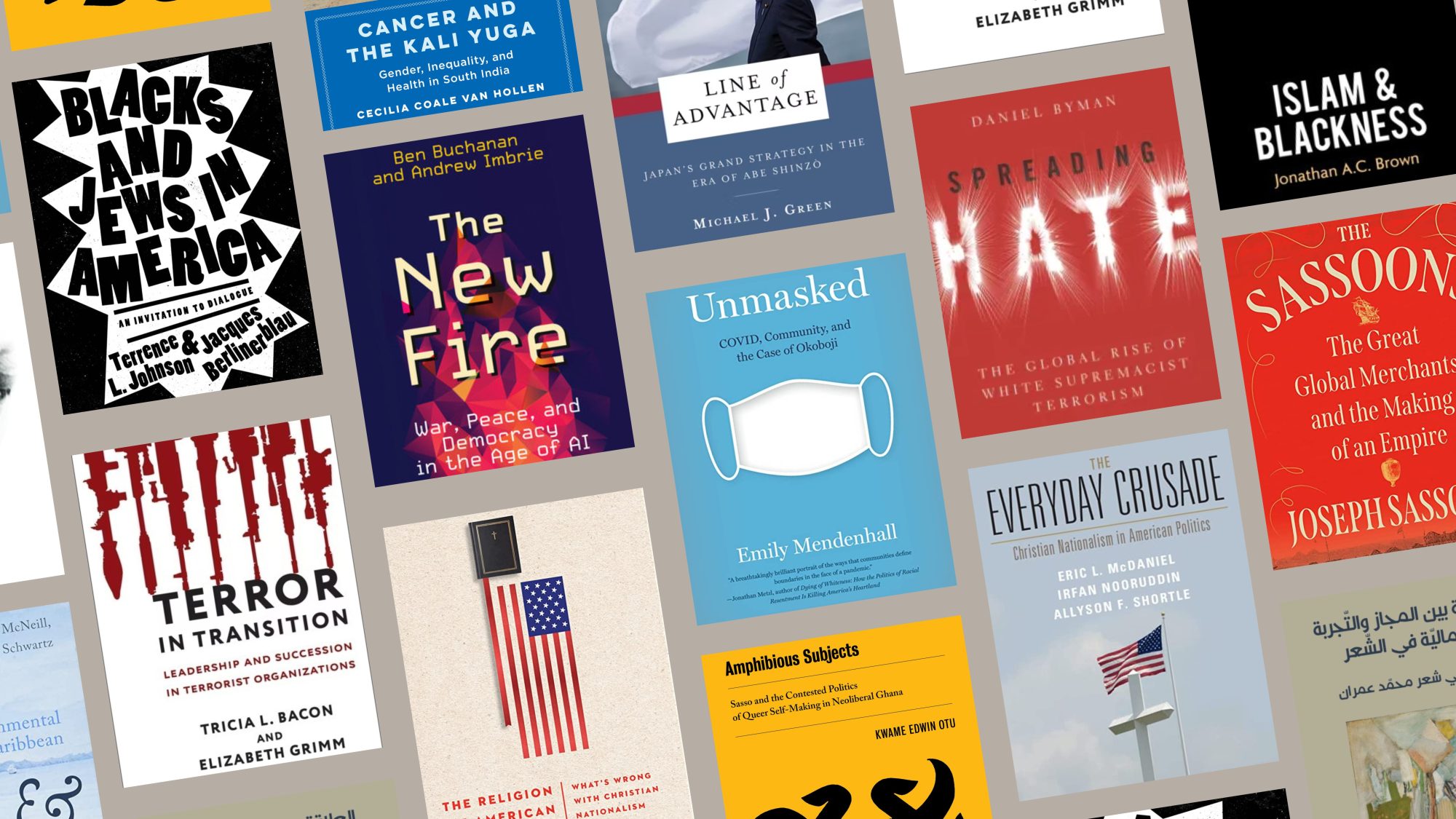In 2022, SFS faculty used innovative methodologies and source material to create a variety of forward thinking books that analyze key issues of diplomacy, politics, public health, anthropology, economics, history, and the development of various communities. As global issues continue to shift and transform, faculty are using their expertise and research to provide insight on these challenges. SFS professors published books focusing on global issues ranging from the democratic implications of AI in geopolitics to a medical anthropology of a professor’s hometown’s resistance to public health measures during the pandemic.
Mohammad Shawkat AlAhmad, The Relationship Between Metaphor And Aesthetic Experience in Poetry (Shurufat)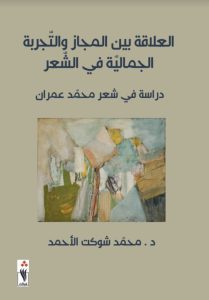
Dr. Mohammad AlAhmad, assistant teaching professor with the Center for Contemporary Arab Studies published his book with the Syrian publishing house Shurufat in Arabic. Featured in the 2022 Winter/Spring CCAS Newsmagazine, the book “takes as a starting point that works of art involve two experiences: that of the aesthetic reception of the subject matter and that of creativity. It attempts to expose the relationship between these two experiences and asks the central question of how the aesthetic experience manifests in the metaphor of the text.”
Excerpted from the 2022 Winter/Spring Center for Contemporary Arab Studies Newsmagazine
“The most important takeaway from this research relates to how the poet uses metaphor and simile to capture the aesthetic experience of the poem’s subject. When a poem expresses the experience of the beautiful, the poet’s imagination is dominated by beautiful themes, from which he derives the elements of his metaphors. And so on with the ugly, the sublime, the heroic, the comic, or the tragic.” – Dr. Mohammad AlAhmad
Read more about The Relationship Between Metaphor and Aesthetic Experience in Poetry.
Jacques Berlinerblau, Terrence L. Johnson, Blacks and Jews in America: An Invitation to Dialogue (Georgetown University Press)
Dr. Jacques Berlinerblau, Rabbi Harold White Chair in Jewish Civilization at SFS, comes together with Dr. Terrence Johnson, expert in African American religions and political thought and former Georgetown professor, to investigate African-American and Jewish-American relations. The book opens up a space for discussion on the intersection of these two groups, both targeted by white supremacy. Berlinerblau and Johnson show the history of the Black-Jewish relationship, and how facets such as the civil rights era, millennial perspectives, and the Israel-Palestine conflict all impact this understanding.
Read more about Blacks and Jews in America: An Invitation to Dialogue.
Jonathan Brown, Islam and Blackness (Oneworld Academic)
Dr. Jonathan Brown, the Prince Alwaleed bin Talal Chair of Islamic Civilization at SFS, examines the claim that Islam is foundationally anti-Black. Brown investigates the relationship between Islam and Blackness and shows how Islamic scripture, law, and Sufism intertwine with historical lived experiences of Muslims inside and outside Africa. What does Blackness mean in scripture in the time of the Prophet Muhammad? How do linguistic elements such as the association of slavery and Blackness impact the faith in their historical context? Brown tackles these questions and more in Islam and Blackness.
“I’m a Muslim scholar, and I believe that my religion condemns racial discrimination and chauvinism. So in studying how these accusations about Islam as anti-Black or pro-slavery emerged and arguing against them I feel like I am living out the best of my religious and scholarly traditions.” – Dr. Jonathan Brown
Read more about Islam and Blackness.
Ben Buchanan, Andrew Imbrie, The New Fire: War, Peace, and Democracy in the Age of AI (MIT Press)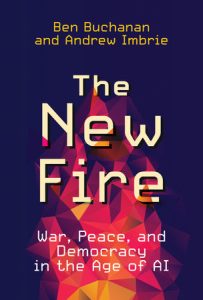
Artificial intelligence’s revolutionizing of the world and its unlimited potential to advance democracy are highlighted in The New Fire, the latest book by co-authors Dr. Ben Buchanan, Director of Technology and National Security at the National Security Council in the White House and on leave as Assistant Teaching Professor at SFS, and Dr. Andrew Imbrie, Associate Professor of the Practice in the Gracias Chair in Security and Emerging Technology at SFS. AI can fuel disinformation campaigns, hacking, and military weapons – but it also has the power to work for democracy. Combining expert knowledge of technology with their backgrounds in international security and geopolitical analysis, Buchanan and Imbrie weave together a story of how AI can be used as a force for good.
“When it comes to geopolitics, a worrying possibility runs throughout this book: that AI will favor autocracy and democracies will struggle to adapt. We push back against this fatalistic narrative and show how democracies can shape the trajectory of AI to safeguard their ideals and security…As the saying goes, ‘it’s hard to make predictions, especially about the future.’ We expected rapid change in the field, but it came even faster. It just goes to show why writing on the geopolitical implications of AI is both an urgent task and a good lesson in humility.” – Dr. Andrew Imbrie
Read more about The New Fire: War, Peace, and Democracy in the Age of AI.
Daniel Byman, Spreading Hate: The Global Rise of White Supremacist Terrorism (Oxford University Press)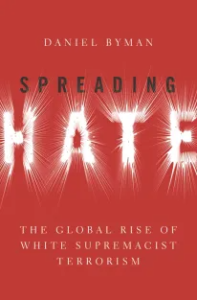
Dr. Daniel Byman’s Spreading Hate presents a compelling account on the evolution of the white power movement in the United States and the global risk white supremacist terrorism poses. Byman combines scholarly research that assesses the threat of the white power movement with expert policy considerations to explain how governments can protect against white power terrorism. An expert on terrorism, and former U.S. government analyst and staff member on the 9/11 Commission, Byman provides an accessible and comprehensive overview of an important threat to the U.S. and Europe.
“My hope is that the book will inform a broader public concerned about the threat of white supremacist violence and help policymakers think about how to combat the threat. As I did my research, I found that white supremacists were both strong and weak — strong because they could tap deep animosities and play to broader political concerns, but weak because they were disorganized and at times incompetent, making them vulnerable to effective counterterrorism.” – Dr. Daniel Byman
Read more about Spreading Hate: The Global Rise of White Supremacist Terrorism.
Michael Green, Line of Advantage: Japan’s Grand Strategy in the Era of Abe Shinzō (Columbia University Press)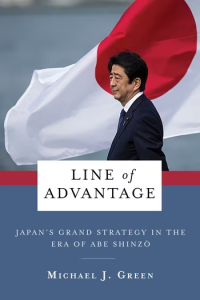
Dr. Michael Green, Chair in Modern and Contemporary Japanese Politics and Foreign Policy at SFS, provides a comprehensive narrative of Japan’s strategic thinking and their dominant role in East Asia and globally. Under Prime Minister Abe Shinzo, Japan made several distinct foreign policy decisions that shaped their political and economic relations with China, the United States, and the Indo-Pacific region. Green analyzes Japan’s new active role, and implications for future foreign policy and interaction in Asia and the United States.
Read more about Line of Advantage: Japan’s Grand Strategy in the Era of Abe Shinzō.
Elizabeth Grimm, Terror in Transition: Leadership and Succession in Terrorist Organizations (Columbia University Press)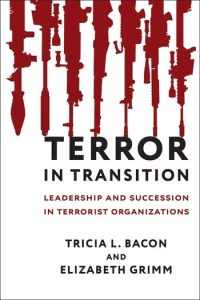
Dr. Elizabeth Grimm, Associate Teaching Professor in the Center for Security Studies (CSS) at SFS, provides an analysis of religious terrorist groups and expert insight on terrorist leadership transition. Co-authored with Dr. Tricia Bacon, Grimm argues that the positioning of the successors of a terrorist group, in relation to the founder, shapes the future of that group. Through extensive research on groups ranging from Islamic terrorist groups to the KKK, Terror in Transition provides actionable recommendations for counterterrorism policy.
“The experience of co-authoring a book with one of my closest friends was truly incredible. Having a partner to push through the intellectual dead-ends and to share in the joy of breakthroughs was so fulfilling. But I could write an entirely different book about what it was like to write a book during the pandemic. With two small children. And schools closed. On an empty Georgetown campus. In addition, my third child was also born 10 days after the manuscript was due to the publisher so we felt the urgency of the project in a real way.” – Dr. Elizabeth Grimm
Read more about Terror in Transition: Leadership and Succession in Terrorist Organizations.
Robert J. Lieber, Indispensable Nation: American Foreign Policy in a Turbulent World (Yale University Press)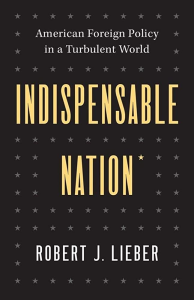
Dr. Robert Lieber, Professor Emeritus of Government and International Affairs and foreign policy expert, argues that the U.S. is a critical presence in the postwar liberal order. The United States’ role in the international system is incredibly important, but what is that role, and what is America not doing that it should do? In Indispensable Nation, Lieber analyzes the stability and influence that the U.S. has as a global leader in comparison to revisionist powers, and the unique position it has.
Read more about Indispensable Nation: American Foreign Policy in a Turbulent World.
John McNeill, Philip J. Morgan, Matthew Mulcahy, and Stuart B. Schwartz, Sea and Land: An Environmental History of the Caribbean (Oxford University Press)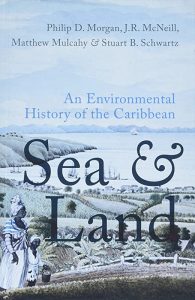
Dr. John McNeill, Distinguished University Professor at SFS and the History Department, weaves together a story of the movement of peoples with the ecological mixing of plants, animals, and microbes in the Caribbean. Sea and Land follows the environmental transformations that spanned from the arrival of the first human populations some 7,000 years ago, the development of the transatlantic slave trade, to the modern era with its rapid currents of biological exchange and environmental transformation. McNeill, co-authored with Philip J. Morgan, Matthew Mulcahy, and Stuart B. Schwartz, provides a unique historical account of how environment and historical events are intertwined.
“I have been interested in Caribbean history of the colonial period (ca. 1492-1960) since my student days and have written previous books on aspects of it. With this book I aimed to leverage long years of study of environmental history and long-term environmental trajectories with my prior study of Caribbean history so as to offer — together with my colleagues — the first general and reasonably comprehensive Caribbean environmental history.” – Dr. John McNeill
Read more about Sea and Land: An Environmental History of the Caribbean.
Emily Mendenhall, Unmasked: Covid, Community, and the Case of Okoboji (Vanderbilt University Press)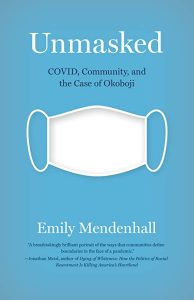
Dr. Emily Mendenhall, a medical anthropologist and SFS Professor, examines a global health problem at the community level, showing how real people, on the ground, dealt with the pandemic. Using her personal experiences about her northwest Iowa hometown, Okoboji, and her expertise in anthropology, Mendenhall explains how American cultural phenomena clashed with official public health guidance in the COVID outbreak that Okoboji experienced in the summer of 2020. Unmasked is a case study of how state political action, public health negotiation, and community disbelief can impact the lives and livelihood of America.
“I was embedded within the community in such a deep way that I was able to fold back the sociocultural complexity behind what people thought, how they behaved and why… The key is listening, learning, observing and triangulating everything you think and hear with other findings.” – Dr. Emily Mendenhall, excerpted from a previous SFS article.
Read more about Unmasked: Covid, Community, and the Case of Okoboji.
Paul Miller, The Religion of American Greatness: What’s Wrong with Christian Nationalism (InterVarsity Press)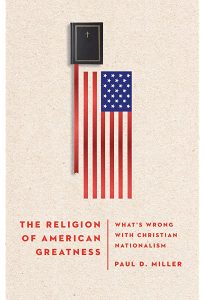
Dr. Paul Miller, Professor of the Practice of International Affairs at SFS, uses his expertise in the classroom and public service to portray the evolution and dangers of Christian nationalism. Miller writes about the evolution of the modern American church and the manipulation of religion to promote illiberal political theory, all as a Christian scholar himself. A stark warning against Christian nationalism, The Religion of American Greatness clearly distinguishes how patriotism differs from the dangerous ideology of Christian nationalism.
Read more about The Religion of American Greatness: What’s Wrong with Christian Nationalism.
Irfan Nooruddin, The Everyday Crusade: Christian Nationalism in American Politics (Cambridge University Press)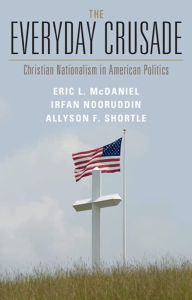
Dr. Irfan Nooruddin, Hamad bin Khalifa Al Thani Professor of Indian Politics at Georgetown, uses his expertise and comprehensive research on American nationalism and religion to present a new theory on reasons behind rising American alt-right attitudes. Co-authored with Dr. Eric L. McDaniel and Dr. Allyson F. Shortle, Nooruddin argues that such attitudes are founded in American Religious Exceptionalism (ARE) myths. ARE is a religious nationalist ideology based in beliefs about the nation’s divine and original purpose. In The Everyday Crusade, historical analysis and extensive research demonstrate how ARE shapes what it means to be American, stances on immigration, foreign policy, and domestic leadership.
Read more about The Everyday Crusade: Christian Nationalism in American Politics.
Kwame Edwin Otu, Amphibious Subjects: Sasso and the Contested Politics of Queer Self-Making in Neoliberal Ghana (University of California Press)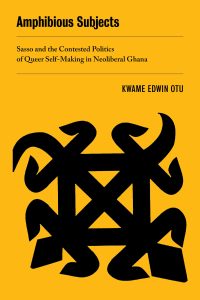
Dr. Kwame Edwin Otu, Associate Professor in the African Studies Program, presents an ethnography of a community of self-identified effeminate men, known as sasso, in coastal Jamestown, a suburb of Accra, Ghana’s capital. Otu combines African philosophy, personal interactions, archival sources, and African and African Diasporic literature to show how sasso navigate homophobia and create an identity beyond Western ideas of gender and sexuality. Amphibious Subjects simultaneously disrupts claims of neoliberal Ghana as a homophobic and heterosexual place, a perception often spread by the Christian heteronationalist state and LGBT+ human rights organizations, while showing the community that the sasso have created.
“I settled on this topic because it was personal. Hence, I wanted to find a scholarly opportunity to understand and make sense of the multiplex backgrounds that shaped queer presence in Ghana. Ethnography made me realize this goal.” – Dr. Kwame Edwin Otu
Read more about Amphibious Subjects: Sasso and the Contested Politics of Queer Self-Making in Neoliberal Ghana.
Joseph Sassoon, The Sassoons: The Great Global Merchants and the Making of an Empire (Pantheon Books)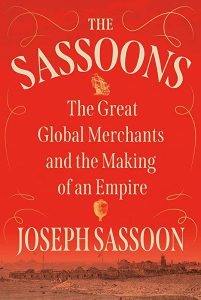
Dr. Joseph Sassoon, Professor of History and Political Economy at Georgetown’s Center for Contemporary Arab Studies, has recently published his fifth book, which focuses on his family, the Sassoons, one of the wealthiest and most powerful families in the 19th and 20th centuries. Rising to power during the globalization of trade and landmark events such as the Opium War and opening of the Suez Canal, the Baghdadi Jewish trading family’s generational saga of success, and eventual decline, is highlighted in Sassoon’s history book. Vast archives, including family ones are included in The Sassoons, and the book contains many photographs showing an intimate and compelling look at one of the richest families in history.
Read more about The Sassoons: The Great Global Merchants and the Making of an Empire.
Ori Z Soltes, Between Thought and Action: An Intellectual Biography of Fethullah Gülen (Blue Dome Press)
Dr. Ori Z Soltes, Teaching Professor at the Center for Jewish Civilization, writes a comprehensive biography of Fethullah Gülen, the renowned Turkish Islamic scholar and cleric whose work for education and peace inspired the Hizmet movement, which is heavily attacked by the Turkish government. Soltes explores the life of Gülen and the work he did to improve the lives of others and also refutes the accusations against Gülen by Turkish President Recep Tayyip Erdoğan and the Justice and Development (AKP) Party. Between Thought and Action looks into how Gülen’s altruistic promotion of thought influences action globally.
Read more about Between Thought and Action: An Intellectual Biography of Fethullah Gülen.
Cecilia Coale Van Hollen, Cancer and the Kali Yuga: Gender, Inequality, and Health in South India (University of California Press)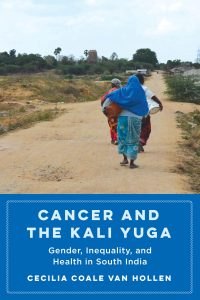
Dr. Cecilia Coale Van Hollen, Teaching Professor in the Asian Studies Program, presents a critical feminist ethnography of the voices of Dalit Tamil women, whose low-income communities have been the focus in the global health field since the discovery that more women died from breast and cervical cancer in India in the early twenty-first century than anywhere else in the world. With global public health interventions to prevent and treat these reproductive cancers, the perspectives of the affected women are highlighted in this book; their opinions show the intersection of public health, gender, caste, and class issues.
“As a critical feminist medical anthropologist, my ethnographic research over the past three decades in India has always been motivated by my commitment to reproductive justice. Dalit women’s narratives about their experiences with reproductive cancers present a powerful and poignant critique of the sociocultural and political-economic conditions that marginalize them and jeopardize their health and well-being in twenty-first century India. My hope is that my book serves as a means to have these voices heard and count within the field of global and public health.” – Dr. Cecilia Coale Van Hollen
Read more about Cancer and the Kali Yuga: Gender, Inequality, and Health in South India.
